
In the quest for cosy homes that don’t cost the Earth or our peace of mind, the dialogue around heating solutions has become more vibrant than ever. Heat pumps have dominated the conversation as a low-carbon alternative to traditional gas boilers, especially amidst governmental pushes towards net zero targets. But they’re not the one-size-fits-all solution we might hope for; diverse homes require diverse heat energy strategies to stay toasty.
As energy prices fluctuate and environmental pressures mount, it’s crucial to recognise that heat pumps, while revolutionary for some, may not be the knight in shining armour for keeping every home warm. This blog is written for homeowners who are stuck navigating through the array of heating options available, seeking a system they can trust that offers both efficiency, dependability and cost savings.
Within the diverse array of heating solutions, NEOS Electric Radiators emerge as a noteworthy alternative, shining with their innovative design and comforting capabilities. As a commendable rival to heat pumps, the NEOS offer’s a blend of contemporary design and technology. They promise to not only keep your home warm, but to reduce your bills and your carbon footprint! As we delve deeper, let us consider whether NEOS could bring you comfort through the frosty months winter.
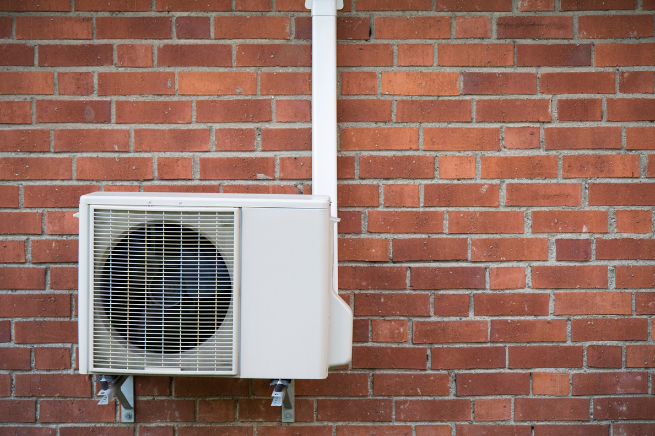
Heat pumps, including varieties like air source heat pumps and ground source heat pumps, have become a hot topic, not merely due to their innovative appeal but because they signify a forward leap in energy-efficient home heating solutions. But what precisely are these devices, and how do heat pumps work?
At their core, heat pumps are devices that transfer heat from one place to another using a compressor and a circulating structure of liquid or gas refrigerant. Heat pumps operate on a simple principle: move heat rather than generate it.
During the colder months, they work by extracting outside heat and transferring it indoors, and in the summer, they reverse the process, acting much like air conditioning units by removing heat from your home. During this process, the heat pump system uses less electrical energy than the amount of heat it delivers, making it excellent at producing heat efficiently. But what are the other benefits of heat pumps?
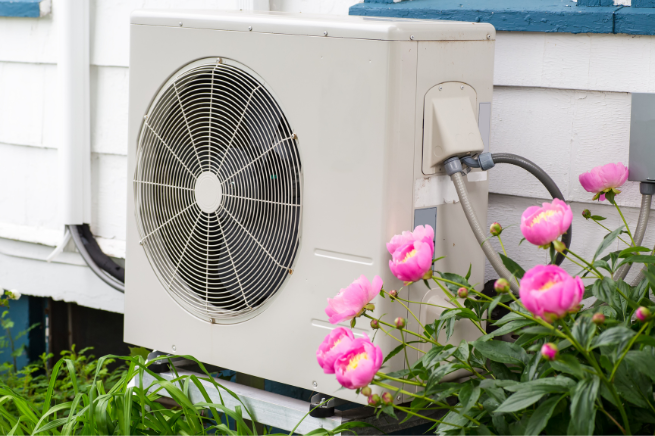
This efficiency is a part of the key selling points of heat pump systems. Heat pumps have been celebrated for their ability to lower carbon emissions and reduce energy bills. They’re often paired with phrases like ‘sustainable living’ and ‘green energy,’ marking both air source heat pump and ground source heat pumps as champions of eco-friendly heating.
Air source heat pumps use renewable energy, which is better for the environment than burning fossil fuels.
There are several government incentives available to encourage the installation of ASHPs, such as the Home Energy Loan, the Renewable Heat Incentive (RHI), and the Green Homes Grant. Government incentives for air source heat pumps are like a tailwind, as they can help push you towards making a more sustainable choice for your home.
Owners praise them for their uniform heating and cooling capabilities, applauding the stable and evenly spread warmth they offer. Additionally, the dual-function of temperature regulation and the potential of reduced heating bills in the long run have contributed to their popularity.
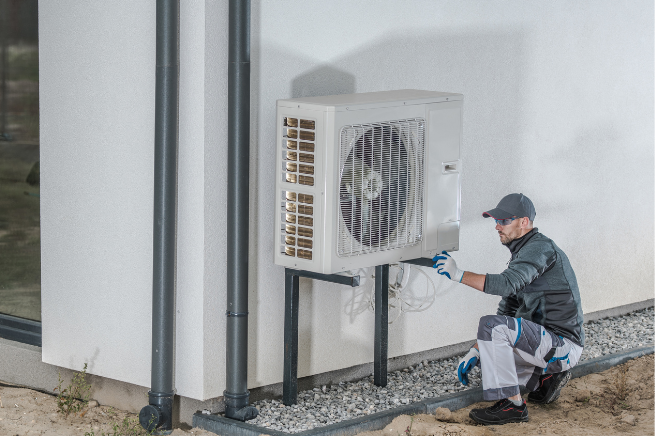
While heat pumps have gained an eco-friendly reputation they come with certain limitations that homeowners must consider. Some point to the high upfront costs and the complex installation, especially in older or less well-insulated homes. Some users have reported that heat pumps can lose their efficiency in extreme cold, which raises questions about their performance in severe winter conditions. This dip in efficiency when the temperature drops very low can lead to doubts about whether heat pumps are the most reliable and cost-effective choice for heating. Consequently, homeowners may consider exploring other heating options, such as the NEOS that provide a more consistent balance of energy efficiency, reliable warmth, and economic value, even in low temperatures and during the coldest months. Here’s a closer look at some of the drawbacks that accompany the installation and operation of heat pumps.
The financial commitment required for a heat pump installation, such as an air source heat pump or ground source heat pump, is often considerable Heat pump installation can be considerably more expensive than alternative heating systems that fit into existing spaces.
Heat pumps may require modifications to your homes structure. This can involve altering or installing new ductwork to fit the system, improving the home’s insulation to retain heat more effectively, and, in the case of ground-source heat pumps, undertaking significant groundwork to lay the necessary underground piping systems. These processes are both invasive and costly, representing a considerable commitment before the benefits of the system can be realised.
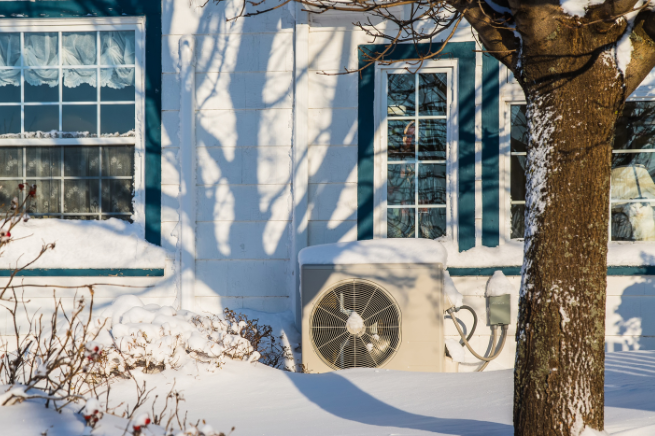
Heat pumps, particularly heat pumps, excel in moderate climates. As the temperature plummets, their efficiency can decrease, meaning they have to work harder to extract warmth from the outside air. This can result in reduced heat output just when you need it most, prompting the need for supplementary heating sources during winter.
While heat pumps are generally quieter than older heating systems, the outdoor units still generate noise, which can be a disturbance, particularly in quiet, residential areas or at night. The level of noise can vary depending on the quality and type of the heat pump, as well as its installation.
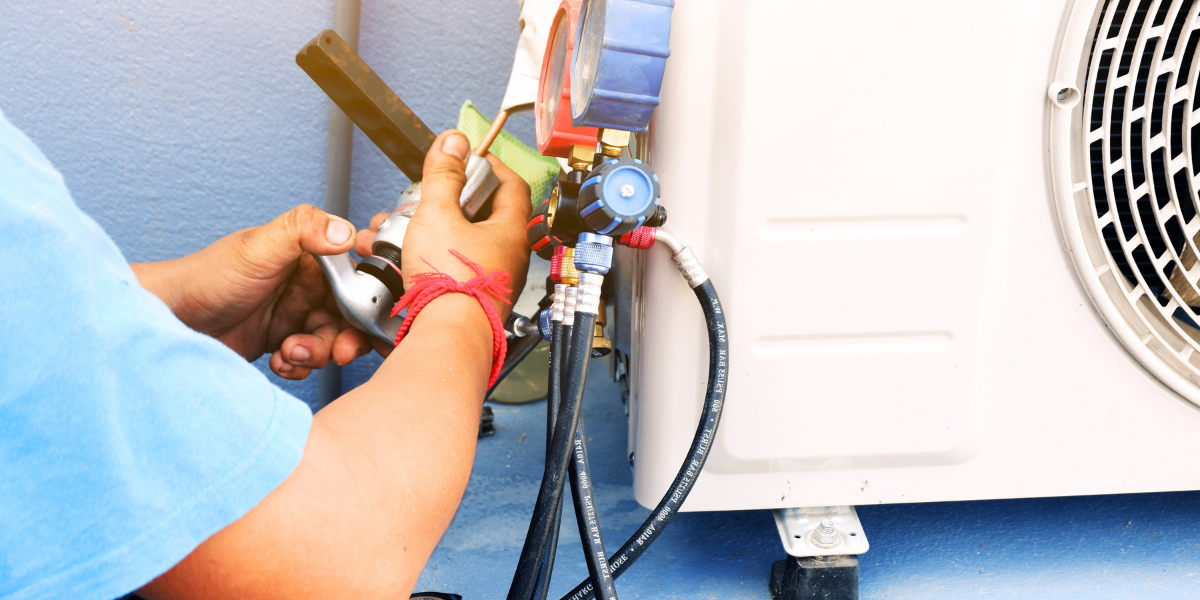
Heat pumps require regular maintenance to operate at optimal efficiency. This includes tasks such as cleaning filters, checking the refrigerant, and ensuring the outdoor unit is free from debris. Neglecting maintenance can lead to decreased performance and a shorter lifespan for the heating system itself.
Understanding these limitations is crucial for homeowners when making an informed decision about their heating needs. While heat pumps may offer long-term savings and environmental benefits, the initial cost, potential decrease in efficiency in cold weather, noise, and maintenance commitments are factors that must be weighed carefully against the alternatives.
Stepping into the spotlight as a noteworthy alternative to heat pumps is the NEOS Electric Radiator, the UK’s most awarded electric radiator. The NEOS is not just your run-of-the-mill electric radiator; it is meticulously crafted to elevate the standard of home heating.
NEOS Electric Radiators harness the latest in heating technology. They employ a unique combination of convection and radiation heat to warm a room, which not only ensures a quick rise in temperature but also maintains the warmth for an extended period, even after the radiator is turned off. This is possible due to the high-quality materials used in the construction of the radiator elements, which have excellent thermal qualities. For instance, their aluminum casing is 290% more conductive than mild steel which is used across other heating systems.
An integral part of the NEOS design is their intelligent thermostatic controls. These sophisticated systems allow for precise temperature regulation, which can be tailored to the individual preferences of each room in your home. Additionally, the NEOS model can be equipped with smart technology that enables users to control their heating remotely via an app, making it possible to warm up your living space before you even step through the door.
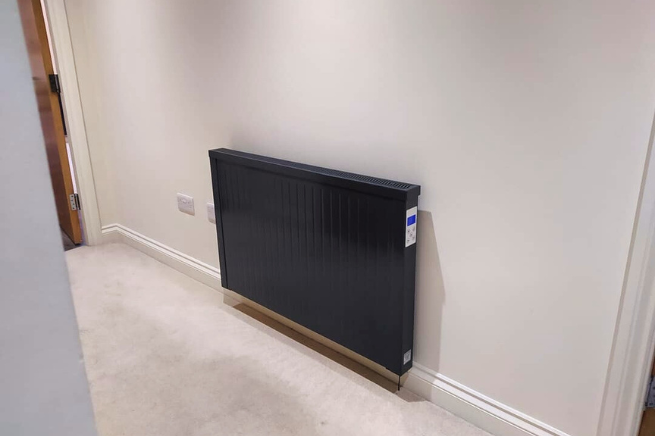
NEOS Radiators shine with their straightforward, non-invasive installation process – a stark contrast to the often complex and disruptive installation of heat pumps. The simplicity of setting up a NEOS Radiator, coupled with its minimal maintenance requirements, provides a hassle-free experience, saving time and avoiding additional costs. This ease extends to their upkeep; NEOS’s robust design ensures longevity, significantly reducing the need for repairs, all underscored by our reassuring 25-year guarantee.
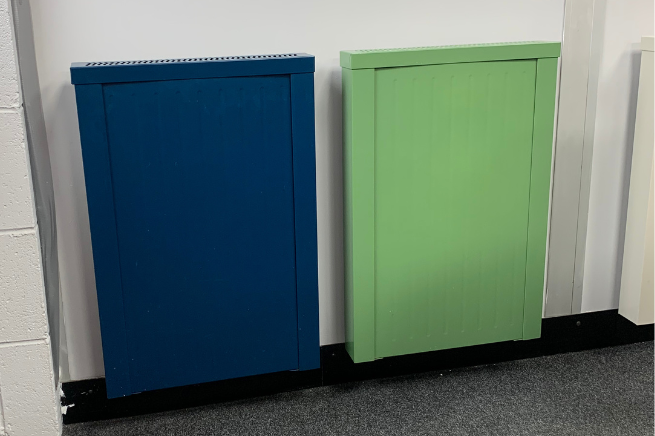
Crafted with the modern homeowner in mind, NEOS Radiators are not just the slimmest on the market but are modular, allowing for colour changes or cosmetic repairs without the need for a complete replacement.
Their modular design allows you to change the front, side and top panels of the radiator when easily. This design ingenuity ensures they enhance, rather than detract from, your living space, marrying functionality with style seamlessly. Additionally, their variety of designs and sizes, means they fit into any decor and space, offering personalised heating solutions without compromising on style.
In terms of energy efficiency, NEOS Radiators excel by minimising heat loss to the back wall and delivering 100% efficiency. Their rapid heat-up times guarantee immediate comfort, sparing you from the extended wait often associated with heat pump systems warming up. Precision control allows for heating spaces only when required, avoiding the inefficiencies of central heating systems and leading to potential savings on energy bills.
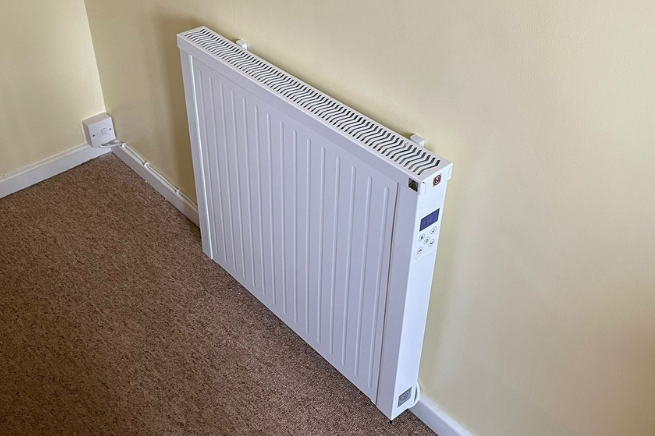
The zonal heating capabilities of NEOS Radiators mean you can heat individual areas as needed, providing tailored comfort and energy efficiency. The range of thermostat options means you can control your heating in a way that suits you.
Opting for NEOS Radiators can be financially advantageous. The initial investment can translate into significant energy bill reductions over time, thanks to their efficient electric heating and the ability to reduce overall running costs, energy consumption and operating costs. Our running cost guide illustrates how the NEOS can be a cost-effective choice.
The assurance of a 25-year warranty with NEOS Radiators reflects the confidence in their durability and performance. Combined with exceptional customer service, choosing NEOS means investing in a reliable, long-term solution for home heating, with the peace of mind that comes from knowing you are well-supported throughout the lifespan of your radiators.
In essence, NEOS Electric Radiators are not only a viable alternative to heat pumps but also a wise investment that promises comfort, control, efficiency, and a touch of elegance, ensuring your home remains a sanctuary of warmth whatever the season.

To summarise, NEOS Electric Radiators offer a seamless and efficient alternative to heat pumps, merging cutting-edge technology with user-centric design to suit diverse household needs. Their ease of installation, low maintenance, and sleek appearance make them a smart choice for modern living. With the ability to provide immediate warmth, energy savings, and customisable comfort, NEOS Radiators represent not just a heating solution but a savvy investment in long-term home comfort. For those considering a new approach to heating their homes, NEOS stands out as a robust and reliable option, ensuring a warm home environment regardless of the season.
Curious to see how the NEOS can benefit you? Download our free guide to explore the NEOS in more detail.
Tags: Comparisons.

If you are considering electric heating/electric radiators, then this guide tells you everything you need to know. Discover this modern, sustainable and economical method of heating that gives you complete control and comfort. Download Free Guide now.

*Trust Electric Heating needs the contact information you provide to us to contact you about our products and services. You may unsubscribe from these communications at any time. For information on how to unsubscribe, as well as our privacy practices and commitment to protecting your privacy, check out our Privacy Policy.
Quick installation and a 100 day warmth guarantee. Whether you’re buying one or several radiators, if our radiators don’t heat your room to a minimum of 20 degrees we will undertake to upgrade or replace the radiators free of charge.
Book your free consultation